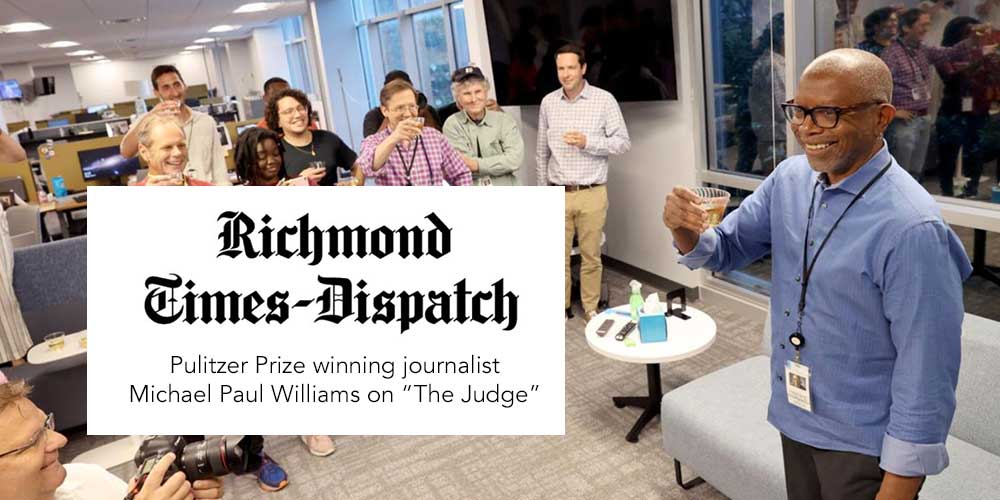Williams: An upcoming documentary on Judge Robert R. Merhige Jr. is about much more than busing
The quixotic mission of U.S. District Judge Robert R. Merhige to desegregate public education in Richmond can obscure a judicial legacy of astonishing breadth.
Merhige ordered the admission of women to the University of Virginia. He presided over one of the worst environmental disasters in U.S. history, the Allied Chemical Co. spill of the insecticide Kepone into the James River. And he handled one of the largest product liability cases of its era, involving Richmond-based pharmaceutical company A.H. Robins and its Dalkon Shield intrauterine device.
“He was just in the middle of all these high-profile cases,” said Al Calderaro of the American Documentary Film Fund, a Richmond nonprofit. “And having been a history major in undergraudate school, there are just people in history who wind up being in the middle of everything, it seems like. So, I started thinking, and finally said: ‘Well, this would make a good documentary.’ ”
Calderaro and his film fund partner, director Robert Griffith, are poised to release “The Judge: Character. Cases. Courage” for public television and beyond.
In making the film, they discovered that Merhige — whose pet dog was shot and whose guesthouse was burned down during the early 1970s — remains a polarizing figure nearly a half-century after he ordered crosstown and later cross-jurisdictional busing to achieve the school desegregation that a U.S. Supreme Court ruling had not.
“I’ve had people ask what Al and I are doing, and we say we’re doing this documentary on Judge Merhige, and sometimes, literally, it’s like the whole conversation shifts. ‘I lived through that. So don’t tell me about Judge Merhige,’” Griffith said, recalling the conversations.
“There are still judge haters out there,” Calderaro said. It wasn’t always evident in their fundraising for the film — some gave generously, others never responded — but, “You kind of get a vibe that, yeah, he’s still controversial. And we’re still mired in some of the same problems.”
Indeed, Richmond Public Schools long ago resegregated after white residents fled to the suburbs. The recent failure by RPS to institute school pairing shows we’re still struggling with how to best create a more racially and socioeconomically diverse school district.
That divide is evident in the documentary, with a busing opponent cringing at what might have happened if Merhige’s plan to consolidate the city school district with those in Chesterfield and Henrico counties had not died at the U.S. Supreme Court.
Rodney A. Smolla, dean of the Widener University Delaware Law School and a former law dean at University of Richmond, also wondered what might have been — but with a sense of loss, not relief. And I’m with him: Metro Richmond would be a better place today.
Merhige, a New York native, courted controversy from the moment he arrived in Richmond. During his first week on the bench, he freed black activist H. Rap Brown, who was being held here, after the government dawdled in charging him with a crime.
“He made sure that no one was going to be disregarded because they were the little person, as he would say, versus the giant government,” said Chief Judge Roger Gregory of the 4th U.S. Circuit Court of Appeals.
But aspects of Merhige’s life outside the bench left him open to criticism and charges of hypocrisy. During the midst of the busing furor, he sent his son to a private school. And he was a member of the race- and gender-exclusive Commonwealth Club.
The documentary includes archival footage of Merhige, family photos, and interviews with former Govs. Gerald Baliles, Mark Warner, Tim Kaine and Anne Holton, a former Virginia first lady and secretary of education, among others. It will air on Richmond’s VPM PBS.
“We don’t have dates in mind yet, but are looking at the film to decide when it best fits,” said Mason Mills, senior producer and director for VPM, Richmond’s public broadcasting company.
The filmmakers are also in talks with American Public Television that could lead to the documentary’s distribution to public television stations nationwide. And they plan to release a longer, theatrical version for screenings at law schools, bar associations and film festivals, they said.
So far, they’ve spent just under $400,000 on the film and estimate that it will cost close to half a million dollars after marketing and distribution.
It’s worth seeing, particularly for individuals — and I was one of them — who have fixated on Merhige’s role in busing and largely missed the judge who seemed controversial but whose rulings seldom got overturned.
It’s difficult to imagine the 1970s without coming across Merhige’s judicial hand, whether it involved Watergate criminals, the break-in at the office of the psychiatrist of Pentagon Papers leaker Daniel Ellsberg, or the 1979 anti-Ku Klux Klan rally in Greensboro, N.C., that resulted in the shooting death of five members of the Communist Workers’ Party.
The subject of this documentary remains as relevant as ever in a nation rife with division over questions of race, educational equity, abuse of power and fealty to the constitution.
“The real problems, he was willing to face,” Calderaro said. “And the tough problems, he was willing to face.”
(804) 649-6815
Twitter: @RTDMPW


